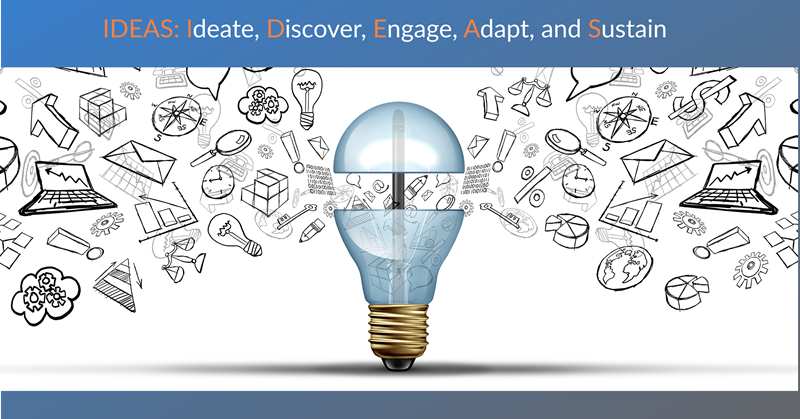In today's rapidly evolving business landscape, innovation is more important than ever for accounting firms seeking to remain competitive and thrive. With the rise of automation, offshoring, and real-time accounting, clients' expectations have shifted, and the industry is undergoing a significant transformation. To attract top talent and maintain a competitive edge, accounting firms must embrace innovation and adapt to these changes. In this article, we will discuss a framework called IDEAS (Ideate, Discover, Engage, Adapt, Sustain) that accounting firms can use to foster a culture of innovation.
The IDEAS Framework
The IDEAS framework consists of five key components:
1. Ideate: Encourage curiosity, questioning, and exploration within the firm. Embrace new technologies and methodologies, provide training and support for employees, and emphasize the importance of a value mindset focused on client needs.
Encourage creativity and generate innovative ideas by hosting brainstorming sessions, design thinking workshops, and hackathons. Additionally, offering innovation training programs to your employees will help them understand the importance of innovation and provide them with the skills needed to contribute effectively.
2. Discover: Evaluate and refine ideas by prioritizing those with the highest potential impact and aligning them with the firm's strategic objectives. Use techniques such as market research, competitor analysis, and customer feedback to identify potential areas for innovation. In addition, consider hosting internal idea competitions to tap into the collective intelligence of your team and create a healthy spirit of competition.
3. Engage: Foster collaboration and open communication among employees to improve decision-making. Implement feedback loops to gather input and drive continuous improvement. Empower employees by delegating decision-making authority and encouraging ownership of projects. Create a safe space for experimentation and failure and recognize innovative efforts.
Building a strong foundation for innovation requires collaboration and communication. Form cross-functional teams to work on innovative projects and foster a sense of shared ownership. Utilize open innovation platforms to encourage contributions from a wider audience, and designate innovation champions within your organization to drive innovation efforts. Hackathons can also be an engaging and fun way to problem-solve and quickly generate new ideas.
4. Adapt: Remain agile and responsive to industry changes. Balance adherence to rules with the flexibility to explore new approaches. Replace task-oriented checklists with more comprehensive process overviews and transition to value-based pricing.
Embrace agile project management and lean methodologies to facilitate rapid iteration and learning from failures. Continuous improvement initiatives and organizational learning can help your firm remain flexible and responsive to changes in the industry, allowing you to adapt and refine your processes.
5. Sustain: Continuously review and update processes, workpapers, and technologies to ensure relevancy. Encourage employees to share knowledge and best practices and establish metrics to measure innovation success.
Ensuring long-term success in innovation requires ongoing efforts to maintain momentum. Develop knowledge-sharing platforms that enable employees to learn from one another and stay informed on the latest trends and developments. Establish innovation metrics and KPIs to track progress and inform decision-making and conduct regular innovation reviews to assess the impact of your efforts and make necessary adjustments. Finally, celebrate innovation successes by recognizing and rewarding your team's hard work and creative problem-solving efforts.
How to Measure Innovation Success
In the Sustain phase of the IDEAS framework, it's essential to have the right metrics in place to evaluate the success of your innovation initiatives. Michael Lewrick, a renowned author and expert in design thinking, has recently published a fantastic book, "Design Thinking and Innovation Metrics," which can be a valuable resource for understanding how to measure innovation effectively.
One of the unique aspects of Lewrick's book is the incorporation of graphic illustrations, which makes the content impactful and a delight to read. He emphasizes the importance of avoiding "vanity" metrics, such as the number of ideas curated, and instead focuses on more meaningful measures of innovation success. By incorporating Lewrick's insights and recommendations, accounting firms can ensure that they are not only fostering a culture of innovation but also tracking their progress and results accurately. To learn more, you can check out his book here.
Some key metrics to consider include:
- Innovation ROI: The financial return on investment for innovation projects.
- Time to market: The time it takes for new products or services to reach customers.
- Employee engagement in innovation: The level of participation and involvement of employees in innovation initiatives.
Dr. Lewrick recommends utilizing the OKR (Objectives/Key Results) framework to set a measurable foundation for innovation. You can learn more about the OKR methodology by reading John Doerr’s book, Measure What Matters.
Final Thoughts on Innovating in Accounting Firms
Fostering a culture of innovation in accounting firms is critical for their success in an increasingly competitive and rapidly changing business landscape. By embracing the IDEAS framework and implementing the suggested methods, accounting firms can effectively drive innovation and create a more agile, adaptable, and forward-looking organization. The time for change is now – accounting firms must take the necessary steps to embrace innovation and transform their businesses for a successful future.
In the words of the late innovation guru Clayton Christensen, "Disruptive innovation can hurt if you are not the one doing the disrupting." To avoid being left behind, accounting firms must embrace the IDEAS framework, invest in innovation, and adapt to the evolving industry landscape.
.png?width=150&height=63&name=TWRlogo-regmark_blueblack%20(1).png)
.png)










Do you have questions about this article? Email us and let us know > info@woodard.com
Comments: